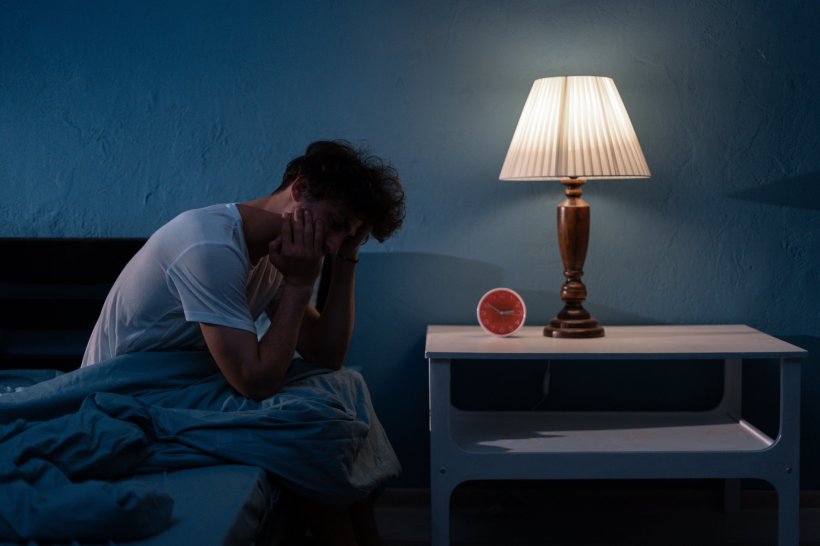
© Andrii Lysenko – stock.adobe.com
News • Health consequences of climate change
Heatwaves raise sleep apnoea risk in Europe
During heatwaves, there is an increase in the number of people suffering with obstructive sleep apnoea (OSA), according to a major new study.
The research was published in the European Respiratory Journal.
People with OSA often snore loudly, their breathing starts and stops during the night, and they may wake up several times. Not only does this cause excessive sleepiness, but it can also increase the risk of high blood pressure, stroke, heart disease and type 2 diabetes. Researchers say their findings are particularly important as heatwaves are becoming more frequent and intense due to climate change.
As global temperatures continue to rise, we can expect more people to be affected and more severe cases, which has serious implications for public health
Danny Eckert
The research was carried by a team from the Adelaide Institute for Sleep Health and FHMRI Sleep Health at Flinders University, Australia, led by Dr Lucía Pinilla. Researchers analysed data on 67,558 people across 17 European countries, all of whom regularly use under-mattress sleep sensors and agreed to share their data anonymously. The sleep sensors track sleep patterns, snoring, apnoea events (pauses in breathing) and heart rate. Most participants were male (79%), with an average age of 52 years. Researchers looked at the sleep data across five European summers from January 2020 to September 2024. They matched each participant’s location with local nightly temperatures to assess the impact of heatwaves. During the study period, there were two or three heatwaves per year on average with each heatwave lasting for around four to five days.
When researchers analysed the data, they found that the risk of people suffering with moderate-to-severe OSA increased by 13% at the peak of a heatwave. They also found that for every 1°C rise in the nighttime temperature during a heatwave, the prevalence of moderate-to-severe OSA increases by 1.1%. The risk was even higher when humidity was also high. Dr Pinilla said: “Our results show that during summer heatwaves, obstructive sleep apnoea became more common and more severe. OSA should now be considered alongside other chronic diseases that are worsened by climate change. Heatwaves are not only uncomfortable, but they can also directly affect how we breathe and sleep. These effects are likely to be similar in other parts of the world and may be even more pronounced in regions with hotter climates or more frequent heatwaves. However, factors like housing quality and access to air conditioning could influence the severity of the impact.”
Recommended article

Article • Collection
Focus on environmental medicine
Harmful substances in the soil, water and air also endanger people's health. In recent years, environmental medicine has been increasingly concerned with the consequences of climate change.
Co-author Dr Bastien Lechat added: “While our study didn’t explore the exact mechanisms behind this link, we know that hot nights often disrupt sleep by making it lighter and more fragmented. Heat can also lead to fluid retention, which may worsen OSA. Additionally, people may be less likely to use treatments like continuous positive airway pressure (CPAP) machines during hot weather, or they may become dehydrated, further compounding the issue.”
The team now plans to investigate how hot nights affect breathing during sleep, why OSA worsens and whether cooling strategies or behavioural changes can help reduce the impact. Senior author and Matthew Flinders Professor Danny Eckert said: “Our findings provide compelling evidence that heatwaves can significantly worsen obstructive sleep apnoea. As global temperatures continue to rise, we can expect more people to be affected and more severe cases, which has serious implications for public health. Sleep apnoea is already underdiagnosed and undertreated. With climate change intensifying its severity, there’s an urgent need to improve diagnosis, treatment access and public awareness.”
Professor Sofia Schiza, Head of the European Respiratory Society group on sleep disordered breathing, based at the University of Crete, Greece, who was not involved in the research said: “Obstructive sleep apnoea is a common condition that can increase the risk of serious health problems, such as heart disease and strokes, but many sufferers do not realise they have a problem. This research shows how heatwaves, where the temperature remains high overnight, increase the risk of OSA. This finding highlights the importance of preparing for hot nights, for example by using a fan and drinking plenty of water, especially for people with sleep disorders. It also suggests that OSA is likely to become more common and more severe due to global warming.”
Source: European Respiratory Society
29.10.2025





